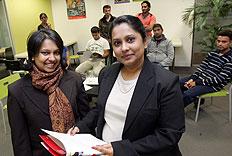Foreign students don't come cheap
UNIVERSITIES are spending more than $64 million a year paying offshore agents commission to recruit international students as the battle for the overseas market intensifies.

UNIVERSITIES are spending more than $64 million a year paying offshore agents commission to recruit international students as the battle for the overseas market intensifies.
Some education providers pay up to 25 per cent commission while others offer bonuses to agents who recruit large numbers of pupils.
Existing students are given incentives to recruit their family and friends, with one university offering vouchers for "educational products" if students referred others to the institution.
Hundreds of education agents across dozens of countries recruit more than 50per cent of all international students coming into Australia, and often agents have contracts with multiple institutions.
Universities pay agents up to 10per cent of an international student's first year fees while private vocational and training colleges can fork out as much as 25 per cent.
Concerns have been raised that some smaller agents may be motivated by commission rates when directing students to institutions.
But universities and education agents say fierce competition and strict federal government legislation prevent this from happening.
Deakin University international division executive director Liz Stinson said education agents were almost like the university's representatives or distributors: "How else can we be in so many countries?"
Ms Stinson said Deakin paid agents 10 per cent but also offered incentives. "Ten per cent might be the best rate for 20 students but I might give 12 per cent for the 21st student," she said.
Queensland University of Technology deputy vice-chancellor (international) Vi McLean said a substantial proportion of international students were recruited through education agents: "I think the only way to see it is as a cost that is necessary to recruit international students."
RMIT University international services director Michelle Hoodbhoy said RMIT paid "standard" commission rates to its agents. She said the university paid 10 per cent for university courses, 12 to 15 per cent for TAFE and foundation studies, and 15 to 20 per cent for English language courses.
Ms Hoodbhoy said she was not concerned by agents in the higher education sector, but she was concerned about some in the private vocational training sector.
"Anecdotally we have heard that some (private colleges) pay 20 to 25 per cent of first year fees," she said.
National Tertiary Education Union policy officer Paul Kinest said there were suggestions some agents may put their financial interests first and direct students to institutions that paid the most commission.
Indo-Australian Education Centre consultant Bina Shah said distressed students came to the centre claiming they had been wrongly directed into a course by other education agents. "I have seen doctors sent to study horticultural courses and nurses sent to cookery courses," she said. "It is very sad to see that agents are directed by the commission."
The education agent said the centre tried to find the best course for students rather than being ruled by fee considerations or trying to get students permanent residency.
IDP Education, an agent part-owned by 38 universities that brings in 20 per cent of all international students to Australia, said the agent process is subject to strict government regulation and is impartial.
Managing director Tony Pollock said agents played a very important role: "They provide a way in which universities can speak to students in many different countries."
According to the Australian Universities International Directors Forum, 33 universities paid $64million in commissions in 2005, which was equal to 3.8 per cent of their total international student revenue.




To join the conversation, please log in. Don't have an account? Register
Join the conversation, you are commenting as Logout